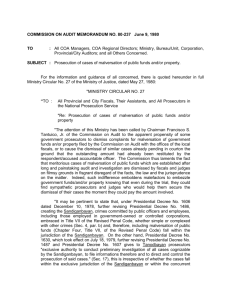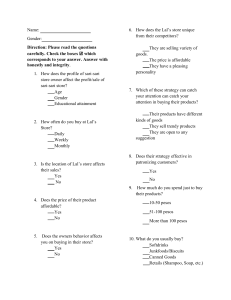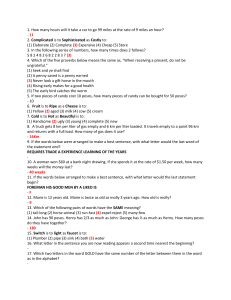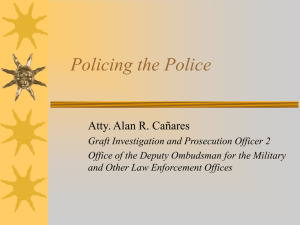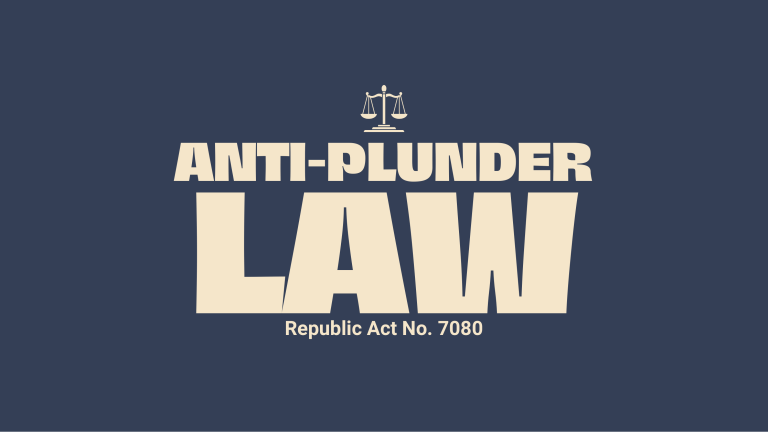
ANTI-PLUNDER LAW Republic Act No. 7080 WHAT IS PLUNDER When any public officer who, by himself or in connivance with members of his family, relatives by affinity or consanguinity, business associates, subordinates or other persons, amasses, accumulates or acquires ill-gotten wealth through a combination or series of overt or criminal acts in the aggregate amount or total value of at least Seventy-five million pesos (P75,000,000.00). WHO IS LIABLE FOR THIS CRIME Any public officer who commits plunder and any person who participated with said public officer in the commission of plunder WHAT IS ILL-GOTTEN WEALTH Ill-gotten wealth means any asset, property, business enterprise or material possession of any person within the purview of Section Two (2) hereof, acquired by him directly or indirectly through dummies, nominees, agents, subordinates and/or business associates HOW IS ILL-GOTTEN WEALTH ACQUIRED Through misappropriation, conversion, misuse, or malversation of public funds or raids on the public treasury; By receiving, directly or indirectly, any commission, gift, share, percentage, kickbacks or any other form of pecuniary benefit from any person and/or entity in connection with any government contract or project or by reason of the office or position of the public officer concerned; By the illegal or fraudulent conveyance or disposition of assets belonging to the National Government or any of its subdivisions, agencies or instrumentalities or government-owned or -controlled corporations and their subsidiaries; By obtaining, receiving or accepting directly or indirectly any shares of stock, equity or any other form of interest or participation including promise of future employment in any business enterprise or undertaking; By establishing agricultural, industrial or commercial monopolies or other combinations and/or implementation of decrees and orders intended to benefit particular persons or special interests; or By taking undue advantage of official position, authority, relationship, connection or influence to unjustly enrich himself or themselves at the expense and to the damage and prejudice of the Filipino people and the Republic of the Philippines. PENALTIES FOR PUBLIC OFFICERS Any public officer guilty of the crime of plunder and shall be punished by life imprisonment with perpetual absolute disqualification from holding any public office. OTHER PARTICIPANTS Any person who participated with said public officer in the commission of plunder shall likewise be punished. In the imposition of penalties, the degree of participation and the attendance of mitigating and extenuating circumstances shall be considered by the court. WHAT HAPPENS TO THE ILL-GOTTEN WEALTH? The court shall declare any and all ill-gotten wealth and their interests and other incomes and assets including the properties and shares of stock derived from the deposit or investment thereof forfeited in favor of the State. Until otherwise provided by law, all prosecutions under this Act shall be within the original jurisdiction of the Sandiganbayan. IS IT NECESSARY TO PROVE EACH AND EVERY CRIMINAL ACT DONE? NO For purposes of establishing the crime of plunder, it shall not be necessary to prove each and every criminal act done by the accused in furtherance of the scheme or conspiracy to amass, accumulate or acquire ill-gotten wealth, it being sufficient to establish beyond reasonable doubt a pattern of overt or criminal acts indicative of the overall unlawful scheme or conspiracy. WHAT HAPPENS IF A PUBLIC OFFICER IS CHARGED AND CONVICTED OF PLUNDER? Any public officer against whom any criminal prosecution under a valid information under this Act in whatever stage of execution and mode of participation, is pending in court, shall be suspended from office. Should he be convicted by final judgment, he shall lose all retirement or gratuity benefits under any law, but if he is acquitted, he shall be entitled to reinstatement and to the salaries and other benefits which he failed to receive during suspension, unless in the meantime, administrative proceedings have been filed against him. ARTICLE 213 - 216 FRAUDS AND ILLEGAL EXACTIONS AND TRANSACTIONS ARTICLE 213 FRAUDS AGAINST THE PUBLIC TREASURY AND SIMILAR OFFENSES The penalty of prision correccional in its medium period to prision mayor in its minimum period, or a fine ranging from Forty thousand (P40,000) to Two million pesos (P2,000,000), or both, shall be imposed upon any public officer who: 1. In his official capacity, in dealing with any person with regard to furnishing supplies, the making of contracts, or the adjustment or settlement of accounts relating to public property or funds, shall enter into an agreement with any Interested party or speculator or make use of any other scheme, to defraud the Government; 2. Being entrusted with the collection of taxes, licenses, fees and other imposts, shall be guilty or any of the following acts or omissions: (a) Demanding, directly, or indirectly, the payment ofsums different from or larger than those authorized by law. (b) Failing voluntarily to issue a receipt, as provided by law, for any sum of money collected by him officially. (c) Collecting or receiving, directly or indirectly, by way of payment or otherwise things or objects of a nature different from that provided by law. When the culprit is an officer or employee of the Bureau of Internal Revenue or the Bureau of Customs, the provisions of the Administrative Code shall be applied. ARTICLE 213 The public officer must act in his official capacity. ELEMENTS OF FRAUD AGAINST PUBLIC TREASURY That the offender be a public officer. That he should have taken advantage of his office, that is, he intervened in the transaction in his official capacity. That he entered into an agreement with any interested party or speculator or made use of any other scheme with regard to (1) furnishing supplies, (2) the making of contracts, or (3) the adjustment or settlement of accounts relating to public property or funds. That the accused had intent to defraud the Government. The offender must have the duty as public officer to deal with any person with regard to furnishing supplies, the making of contracts, or the adjustment or settlement of accounts relating to public property or funds. The crime of frauds against public treasury is consummated by merely entering into an agreement with any interested party or speculator or by merely making use of any other scheme to defraud the Government. It is not necessary that the Government is actually defrauded by reason of the transaction. It is sufficient that the public officer who acted in his official capacity had the intent to defraud the Government. ARTICLE 213 Mere demand for larger or different amount is sufficient to consummate the crime. ELEMENTS OF ILLEGAL EXACTIONS The offender is a public officer entrusted with the collection of taxes, licenses, fees and other imposts. He is guilty of any of the following acts or omissions: (1) Demanding, directly or indirectly, the payment of sums different from or larger than those authorized by law; or Collecting officer must issue official receipts. Where the deputy sheriff received certain amounts in connection with the performance of his duties without issuing the corresponding official receipts thereof, he is guilty of illegal exaction penalized by paragraph 2(b) of Article 213 of the Revised Penal Code. When there is deceit in demanding greater fees than those prescribed by law, the crime committed is estafa and not illegal exaction. (2) Failing voluntarily to issue a receipt, as provided by law, for any sum of money collected by him officially; or Tax collector need not account for tax collected. When a public officer, whose official duty is to collect taxes, receives a payment in said concept, he makes himself directly accountable to the government for the money so collected and received. (3) Collecting or receiving, directly or indirectly, by way of payment or otherwise, things or objects of a nature different from that provided by law. Hence, a tax collector who collected a sum larger than that authorized by law and spent all of them is guilty of two crimes, namely: (1) illegal exaction, for demanding a greater amount; and (2) malversation, for misappropriating the amount collected. Officer or employee of Bureau of Internal Revenue or Bureau of Customs not covered by this article. ARTICLE 214 OTHER FRAUDS In addition to the penalties prescribed in the provisions of Chapter Six, Title Ten, Book Two, of this Code, the penalty of temporary special disqualification in its maximum period to perpetual special disqualification shall be imposed upon any public officer who, taking advantage of his official position, shall commit any of the frauds or deceits enumerated in said provisions. Elements: 1. That the offender is a public officer. 2. That he takes advantage of his official position. 3. That he commits any of the frauds or deceits enumerated in Arts. 315 to 318. Arts. 315 to 318, which cover the provisions referred to, define and penalize (1) estafa, (2) other forms of swindling, (3) swindling a minor, and (4) other deceits. ARTICLE 215 PROHIBITED TRANSACTIONS The penalty of prision correccional in its maximum period or a fine ranging from Forty thousand pesos (P40,000) to Two hundred thousand pesos (P200,000), or both, shall be imposed upon any appointive public officer who, during his incumbency, shall directly or indirectly become interested in any transaction of exchange or speculation within the territory subject to his jurisdiction. Elements: 1. That the offender is an appointive public officer. 2. That he becomes interested, directly or indirectly, in any transaction of exchange or speculation. 3. That the transaction takes place within the territory subject to his jurisdiction. 4. That he becomes interested in the transaction during his incumbency. The transaction must be one of exchange or speculation. It is sufficient under this article that the appointive officer has an interest in any transaction of exchange or speculation, such as, buying and selling stocks, commodities, land, etc., hoping to take advantage of an expected rise or fall in price. Purchasing of stocks or shares in a company is simply an investment and is not a violation of the article. An appointive public officer may, within the territory subject to his jurisdiction, engage in the purchase of stocks or shares in any company, because to do so does not mean taking part in a business for gain or profit, but simply to invest funds at a legal interest. But buying regularly securities for resale is speculation. What he may not do is to buy regularly securities for the purpose of profiting by a resale thereof. The appointive public officer should not devote himself to commerce. ARTICLE 215 PROHIBITED TRANSACTIONS The penalty of prision correccional in its maximum period or a fine ranging from Forty thousand pesos (P40,000) to Two hundred thousand pesos (P200,000), or both, shall be imposed upon any appointive public officer who, during his incumbency, shall directly or indirectly become interested in any transaction of exchange or speculation within the territory subject to his jurisdiction. Examples of appointive public officer. Under Art. 14 of the Code of Commerce, the following (among others) may not engage in the commercial profession either in person or by proxy: 1. Justices, judges or fiscals. 2. Employees engaged in the collection and administration of public funds. ARTICLE 216 POSSESSION OF PROHIBITED INTEREST BY A PUBLIC OFFICER. The penalty of arresto mayor in its medium period to prision correccional in its minimum period, or a fine ranging from Forty thousand pesos (P40,000) to Two hundred thousand pesos (P200,000, or both, shall be imposed upon a public officer who directly or indirectly, shall become interested in any contract or business in which it is his official duty to intervene. This provisions is applicable to experts, arbitrators and private accountants who, in like manner, shall take part in any contract or transaction connected with the estate or property in appraisal, distribution or adjudication of which they shall have acted, and to the guardians and executors with respect to the property belonging to their wards or estate. Who are liable for possession of prohibited interest? 1. Public officers who, directly or indirectly, became interested in any contract or business in which it was his official duty to intervene. 2. Experts, arbitrators, and private accountants who, in like manner, took part in any contract or transaction connected with the estate or property in the appraisal, distribution or adjudication of which they had acted. 3. Guardians and executors with respect to the property belonging to their wards or the estate. Actual fraud is not necessary. Actual fraud is not necessary; the act is punished because of the possibility that fraud may be committed or that the officer may place his own interest above that of the government or party which he represents. Intervention must be by virtue of public office held. Example: A Mayor leases the municipal fishponds to himself or his wife for the purpose of gaining from ir, taking advantage of his position to forward his own interest. ARTICLE 217 - 222 MALVERSATION OF PUBLIC FUNDS OR PROPERTY ARTICLE 217 MALVERSATION OF PUBLIC FUNDS OR PROPERTY Any public officer who, by reason of the duties of his office, is accountable for public funds or property, shall appropriate the same, or shall take or misappropriate or shall consent, through abandonment or negligence, shall permit any other person to take such public funds or property, wholly or partially, or shall otherwise be guilty of the misappropriation or malversation of such funds or property, shall suffer: 1. The penalty of prisión correccional in its medium and maximum periods, if the amount involved in the misappropriation or malversation does not exceed Forty thousand pesos (P40,000). 2. The penalty of prisión mayor in its minimum and medium periods, if the amount involved is more than Forty thousand pesos (P40,000) but does not exceed One million two hundred thousand pesos (P1,200,000). 3. The penalty of prisión mayor in its maximum period to reclusion temporal in its minimum period, if the amount involved is more than One million two hundred thousand pesos (P1,200,000) but does not exceed Two million four hundred thousand pesos (P2,400,000). 4. The penalty of reclusion temporal, in its medium and maximum periods, if the amount involved is more than Two million four hundred thousand pesos (P2,400,000) but does not exceed Four million four hundred thousand pesos (P4,400,000). 5. The penalty of reclusion temporal in its maximum period, if the amount involved is more than Four million four hundred thousand pesos (P4,400,000) but does not exceed Eight million eight hundred thousand pesos (P8,800,000). If the amount exceeds the latter, the penalty shall be reclusion perpetua. In all cases, persons guilty of malversation shall also suffer the penalty of perpetual special disqualification and a fine equal to the amount of the funds malversed or equal to the total value of the property embezzled. The failure of a public officer to have duly forthcoming any public funds or property with which he is chargeable, upon demand by any duly authorized officer, shall be prima facie evidence that he has put such missing funds or property to personal uses. (As amended by RA 1060, Republic Act No. 10951, [August 29, 2017]). ARTICLE 217 MALVERSATION OF PUBLIC FUNDS OR PROPERTY Acts punishable in malversation: Elements common to all acts of malversation under Art. 217. 1. By appropriating public funds or property. 2. By taking or misappropriating the same. 3. By consenting, or through abandonment or negligence, permitting any other person to take such public funds or property. 4. By being otherwise guilty of the misappropriation or malversation of such funds or property (a) That the offender be a public officer. (b) That he had the custody or control of funds or property by reason of the duties of his office. (c) That those funds or property were public funds or property for which he was accountable. (d) That he appropriated, took, misappropriated or consented or, through abandonment or negligence, permitted another person to take them. The penalty for malversation is the same whether committed with malice or through negligence or imprudence. Funds or property must be received in official capacity. When a public officer had no authority to receive the money for the Government and upon receipt of the same he misappropriated it, the crime committed is estafa, not malversation. (U.S. vs. Solis, 7 Phil. 195) A public officer having only a qualified charge of Government property without authority to part with physical possession of it unless upon order from his immediate superior, cannot be held liable for malversation. They are liable for theft. A private person conspiring with an accountable public officer in committing malversation is also guilty of malversation. ARTICLE 217 MALVERSATION OF PUBLIC FUNDS OR PROPERTY Government funds include revenue funds and trust funds. Government funds include not only revenue funds but also trust funds. (People vs. Ramos, C.A., 38 O.G. 817) The return of the funds malversed is only mitigating, not exempting, circumstance. Public funds may include: funds from sweepstakes, Red Cross, indemnities. etc. When the shortage is paid by the public officer from his pocket, he is not liable for malversation. But if at the very moment when the shortage is discovered, the accountable officer is notified thereof and he at once presents the money, no prima facie evidence of the crime of malversation can be established. Private property may be involved in malversation Public officers guilty of malversation are guilty not only of national, provincial or municipal funds, revenues or property, but also of other funds or property, even if they belong to private individuals, as long as such funds or property are placed in their custody. (People vs. De la Serna, C.A., 40 O.G. Supp. 12, 159) May a person whose negligence made possible by the commission of malversation by another be held liable as principal by indispensable cooperation in the complex crime of malversation through falsification of a public document by reckless negligence? YES, The Court held in earlier cases that negligence consitutes cooperation to the malversation of another. ARTICLE 218 FAILURE OF ACCOUNTABLE OFFICER TO RENDER ACCOUNTS Any public officer, whether in the service or separated therefrom by resignation or any other cause, who is required by law or regulation to render account to the Commission on Audit, or to a provincial auditor and who fails to do so for a period of two months after such accounts should be rendered, shall be punished by prision correccional in its minimum period, or by a fine ranging from Forty thousand pesos (P40,000) to One million pesos (P1,000,000), or both. Elements: 1. That the offender is a public officer, whether in the service or separated therefrom. 2. That he must be an accountable officer for public tunds or property. 3. That he is required by law or regulation to render accounts to the Commission on Audit, or to a provincial auditor. 4. That he fails to do so for a period of two months after such accounts should be rendered. Demand for accounting is not necessary. Art. 218 does not require that there be a demand by the Commission on Audit or provincial auditor that the public officer should render an account. It is sufficient that there is a law or regulation requiring him to render account. Reason why mere failure to render account by an accountable public officer is punished. The reason for this is that the law does not so much contemplate the possibility of malversation as the need of enforcing by a penal provision the performance of the duty incumbent upon every public employee who handles government funds to render an account of all he receives or has in his charge by reason of his employment. (U.S. vs. Saberon, 19 Phil. 391) Misappropriation is not necessary. It is not essential that there be misappropriation. If there is misappropriation, he would be liable also for malversation under Art. 217. ARTICLE 219 FAILURE OF A RESPONSIBLE PUBLIC OFFICER TO RENDER ACCOUNTS BEFORE LEAVING THE COUNTRY. Any public officer who unlawfully leaves or attempts to leave the Philippine Islands without securing a certificate from the Commission on Audit showing that his accounts have been finally settled, shall be punished by arresto mayor, or a fine ranging from Forty thousand pesos (P40,000) to Two hundred thousand pesos (P200,000) or both. Elements: That the offender is a public officer. That he must be an accountable officer for public funds or property. That he must have unlawfully left (or be on the point of leaving) the Philippines without securing from the Commission on Audit a certificate showing that his accounts have been finally settled. The act of leaving the country must be unauthorized or not permitted by law. ARTICLE 220 ILLEGAL USE OF PUBLIC FUNDS OR PROPERTY Any public officer who shall apply any public fund or property under his administration to any public use other than for which such fund or property were appropriated by law or ordinance shall suffer the penalty of prision correccional in its minimum period or a fine ranging from one-half to the total of the sum misapplied, if by reason of such misapplication, any damages or embarrassment shall have resulted to the public service. In either case, the offender shall also suffer the penalty of temporary special disqualification. If no damage or embarrassment to the public service has resulted, the penalty shall be a fine from 5 to 50 per cent of the sum misapplied. Elements: 1. That the offender is a public officer. 2. That there is public fund or property under his administration. 3. That such public fund or property has been appropriated by law or ordinance. 4. That he applies the same to a public use other than that for which such fund or property has been appropriated by law or ordinance. There is no technical malversation if there is no law or ordinance appropriating public funds or property for a particular purpose. The public funds or property must be appropriated by law or ordinance for a particular purpose. Example of illegal use of public funds is when the fund specifically appropriated for a project is used for a different end. Illegal use of public funds or property distinguished from malversation under Art. 217. (1) The offenders are accountable public officers in both crimes. (2) The offender in illegal use of public funds or property does not derive any personal gain or profit; in malversation, the offender in certain cases profits from the proceeds of the crime. (3) In illegal use, the public fund or property is applied to another public use; in malversation, the public fund or property is applied to the personal use and benefit of the offender or of another person. ARTICLE 221 FAILURE TO MAKE DELIVERY OF PUBLIC FUNDS OR PROPERTY. Any public officer under obligation to make payment from Government funds in his possession, who shall fail to make such payment, shall be punished by arresto mayor and a fine from 5 to 25 percent of the sum which he failed to pay. This provision shall apply to any public officer who, being ordered by competent authority to deliver any property in his custody or under his administration, shall refuse to make such delivery. The fine shall be graduated in such case by the value of the thing, provided that it shall not less than Ten thousand pesos (P10,000). Acts punishable under Art. 221. 1. By failing to make payment by a public officer who is under obligation to make such payment from Government funds in his possession. 2. By refusing to make delivery by a public officer who has been ordered by competent authority to deliver any property in his custody or under his administration. Elements of Failure to Make Payment: 1. That the public officer has Government funds in his possession. 2. That he is under obligation to make payment from such funds. 3. That he fails to make the payment maliciously. Refusal to make delivery of property must be malicious. Under No. 2 (refusal to make delivery of property), the refusal must be malicious also. ARTICLE 222 OFFICERS INCLUDED IN THE PRECEDING PROVISIONS The provisions of this chapter shall apply to private individuals who in any capacity whatever, have charge of any insular, provincial or municipal funds, revenues, or property and to any administrator or depository of funds or property attached, seized or deposited by public authority, even if such property belongs to a private individual. Private individuals who may be liable under Arts. 217 to 221. 1. Private individuals who, in any capacity whatever, have charge of any national, provincial or municipal funds, revenue, or property. 2. Administrator or depository of funds or property, attached, seized or deposited by public authority, even if such property belongs to a private individual. Purpose of Art. 222. The purpose of Article 222 of the Revised Penal Code is to extend the provisions of the Code on malversation to private individuals. (People vs. Escalante, C.A., 49 O.G. 4397) Private property is included, provided it is (1) attached, (2) seized, or (3) deposited by public authority. The expression, "even if such property belongs to a private individual," is a sweeping and all embracing statement so as to include a case where private funds or property are involved, as long as such funds or property are placed in the custody of accountable public officers.

